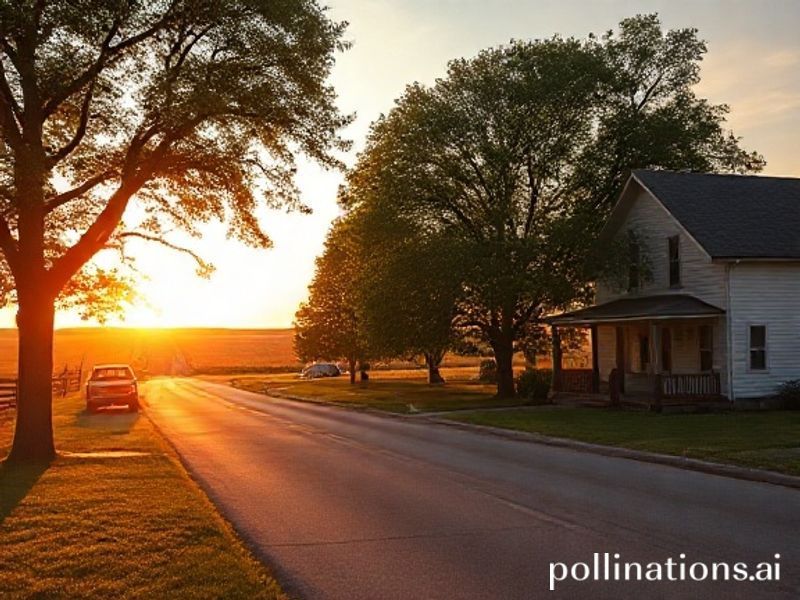Hortman for Sale: How a Minnesota Hamlet Became the World’s Smallest Global Commodity
Hortman, Minnesota: How a Blink-and-Miss Hamlet Became the Canary in Globalization’s Coal Mine
By Our Correspondent, freshly jet-lagged and morally hung-over
Dateline: Somewhere between Amsterdam Schiphol and MSP, nursing lukewarm coffee and a creeping sense of futility.
The first thing you notice about Hortman—population 212 on a generous census day—is that it doesn’t want to be noticed. A water tower, two bars, and a bait shop whose neon “LIVE WORMS” sign flickers like a dying heartbeat. The second thing you notice is that the entire town is for sale on Alibaba. Yes, that Alibaba. Scroll past the bulk orders of USB cables and you’ll find “Authentic Small-Town Experience—Minnesota, USA, 0.8 sq mi, slightly used.” Shipping: negotiable. MOQ: one oligarch.
This is not satire. This is merely Tuesday.
The story begins, as most modern tragedies do, with a spreadsheet. In 2021, the heirs of the Hortman family—descendants of the Swedish immigrant who once planted rutabagas here and pronounced the town’s name like a throat-clear—discovered that the assessed value of their land was roughly one-tenth of a Beijing parking spot. Rather than cling to ancestral sod, they listed the place on an obscure real-estate platform that specializes in “geographic arbitrage opportunities.” Within 48 hours, a consortium of Hong Kong logistics executives bought the deed, sight unseen, intending to convert Hortman into a drone-testing aerodrome. The price? $3.7 million, or about the cost of a mid-tier NFT of a bored ape wearing sunglasses.
Cue the slow-motion car crash we politely call globalization. Overnight, Hortman’s Lutheran church became a pop-up co-working space called “SkyTemple”; the bait shop now sells artisanal cronuts for $8 and calls itself “Bait & Boujee.” The town’s only full-time police officer doubles as the in-house barista because, well, crime and caffeine both require surveillance. Somewhere in the middle of this fever dream, the UN released a white paper titled “Micro-Commodification of Place and the Collapse of Local Sovereignty,” which sounds weighty until you realize it’s exactly the kind of document no one reads unless they’re paid by the adjective.
But let’s zoom out. Hortman isn’t an outlier; it’s a pilot program. From the Scottish Highlands to the Patagonian backwoods, algorithmic capital is strip-mining authenticity the way it once strip-mined copper. The difference is that copper doesn’t post Instagram stories. In Hortman’s case, the new owners promised “immersive Nordic heritage experiences,” then subcontracted the heritage to a call center in Manila. Want to learn traditional lefse-making? Press 2 for English, 3 for Mandarin, and hold for a representative who’s never seen snow.
The geopolitical punch line? The drone tests are for last-mile delivery of Scandinavian-style flat-pack furniture back to Shenzhen, completing a loop so absurd that Kafka would have filed for unemployment. Meanwhile, the original residents—the Andersons, the Carlsons, and one guy named Duane who insists Elvis shot JFK—were offered “lifetime residencies” in a shipping-container tiny-home park outside Duluth. Their acceptance rate: 7%. The rest cashed out and moved to Florida, where the only culture is humidity and the only heritage is alligators.
Back at the former bait shop, I asked the barista-cop whether any of this felt dystopian. He shrugged, steamed oat milk, and said, “Dystopia’s just branding. You want oat or almond?” Which, in three sentences, is the most honest summary of late-stage capitalism I’ve ever heard.
So what does Hortman portend for the wider world? First, that any place—no matter how forgettable—can be flipped like a condo in a city you can’t afford. Second, that the word “authentic” now carries roughly the same weight as “all-natural” on a bag of cheese puffs. Third, and most bleakly, that resistance is not futile; it’s merely unprofitable, and therefore invisible.
As I boarded the flight out, the in-flight magazine boasted of “destination weddings in unspoiled Minnesota hamlets.” The photo was Hortman, Photoshopped to look like a fjord. Somewhere over Greenland, I realized the magazine was published by the same logistics conglomerate that bought the town. The circle closed so neatly it could’ve been drawn by a drone.
Conclusion: Hortman, Minnesota, population now 212 shareholders and one bewildered moose, is the souvenir snow globe of our times—shaken by invisible hands, filled with artificial flakes, and sold back to us at a 400% markup. If you listen closely, you can hear the globe rattle. That’s the sound of the future arriving ahead of schedule, slightly used, batteries not included.







